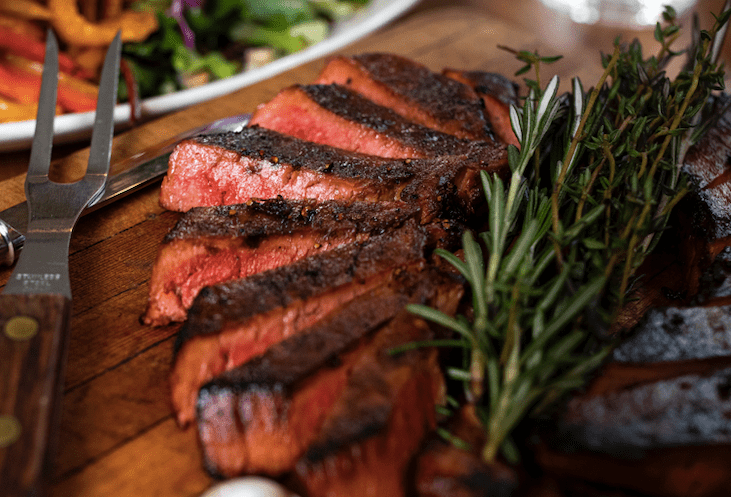Alt-protein is easily the hottest food trend in the world right now, at least as far as venture capital is concerned. A Coloradan startup has just entered the fray with new products and $28 million in Series A funding.
Meati’s funding round, backed by Acre Venture Partners, adds to the more than $1.5 billion invested in alternative protein companies in 2020. Existing investors Prelude Ventures, Congruent Ventures and Tao Capital participated, along with Once Upon A Farm CEO John Foraker and Sweetgreen co-founders Nicolas Jammet and Jonathan Neman.
The Boulder-based startup is developing a line of meat alternatives made from mycelium, the protein-rich root structures of various types of fungi. Its products are designed as stand-ins for ‘whole cuts’ like chicken breasts and beef steaks, to complement the wide range of existing meat-free burgers, nuggets, and meatballs already available to consumers.
Another AFN exclusive from the world of mycelia: Germany’s Mushlabs recently raised $10 million to turn mushroom roots into sustainable meat replacements. Read more here
Mycelium is high in protein and other essential minerals, vitamins, and fiber. It is also fast-growing and low-resource: Meati claims its facilities can make “plate-ready” mycelium with just 18 hours of growing time.
Tyler Huggins told AFN that he and co-founder Justin Whiteley launched the startup with a mission of giving meat eaters and non-meat eaters alike nutritious, sustainable, and “accessible” protein-rich foods “without the use of extruded soy or wheat,” which make up the majority of other alt-meat products on the market.
“We’re conscious meat eaters ourselves. Our intention isn’t necessarily to create vegan products or to completely replace animal products,” Huggins said. “What we want to do is create new, super-nutritious products that diversify our food system and take the pressure away from industrial agriculture.”
Shepherds, not farmers
Mycelium isn’t new to the food system; it is sued in the production of cheese and other plant-based, protein-rich foods such as tempeh. Huggins said that because mycelium is used in established food-making processes, Meati hasn’t had to invest in expensive engineering facilities or developing novel equipment.
“We use a lot of off-the-shelf techniques, borrowing processes from cheese-making and bread-making,” he added. “Our ‘farm’ facility looks a lot like a microbrewery for beer, and the back of the house looks like a cheese processing facility.”
That makes the startup less capital-intensive than other alt-protein companies, Huggins claims.
To produce its alt-steaks, Meati lets the mycelium grow for 18 hours before harvesting it. Huggins described the Meati team as more like shepherds than farmers, “guiding” the mycelium’s development in a controlled environment. Once harvested, it is “gently formed” into different shapes, and then marinated for taste. Precisely how it is shaped and formed is Meati’s trade secret, Huggins said.
“Point is, it’s not heavily processed by any means,” he added. “We use mycelium in its pure and natural form.”
Mass appeal
Meati is still in the product development phase, and plans to use at least the next six months to refine its process and product offering. The company has been leaning on a number of professional chefs for feedback.
What founders Huggins and Whiteley hope to achieve when Meati’s products finally hit the market is mass consumer appeal. One of the ways the company is working to do this is by being price-matched with animal-derived meats.
“We knew from the very beginning that if we wanted to make an impact, it couldn’t just be for people who can afford high-priced food items,” Huggins said.
Top of mind for Meati is the fact that global demand for protein is expected to double by 2050, with most of that growth coming from lower-income countries.
Turns out mycelium is good for more than just protein. Find out why AgFunder invested in ‘alt-leather’ startup MycoWorks here
“We believe we can get to price parity with animal-based products because of the efficiency of mycelium and the way it grows” compared to plant-based meat substitutes made from things like soy or pea protein, Huggins said.
“We didn’t want to work through the same system of commodity crops, where we’re extracting something from the same old system and putting a new sticker on it. We want to help the transition to a more regenerative food system.”
This impactful model, coupled with a commitment to making affordable, complete-protein food, is what drew in investors like Acre.
“For years we have looked for an alternative meat that is as nutritious as it is sustainable,” said the firm’s managing partner Lucas Mann. “With Meati, there is no need to compromise.”





